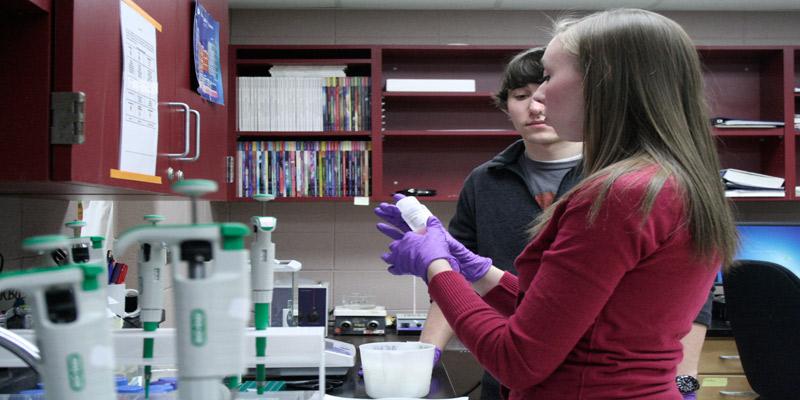Campus leaders: summer tuition freeze could delay end goals of Blugold Commitment
Freeze could likely carry into next school year
Junior chemistry major Ryan McMann and senior biochemistry major Heidi Schmidt work in a Phillips lab on Wednesday. © 2014 Nate Beck.
February 6, 2014
Wander Phillips Science Hall long enough and you’ll likely run into more than a four-foot high cylinder of nitro glycerine.
Between classes Alex Strom and Heidi Schmit, both senior biochemistry majors, pluck away on different branches of a research project in labs on the top floor of Phillips.
“It’s been the best opportunity I’ve ever had,” Strom said. “It’s been really fruitful for me. It’s been fun and opened a lot of doors.”
Strom runs computer models that support Schmit’s lab experiments. The project, led by associate biochemistry professor Sanchita Hati, searches for drug targets, or the key to backdoors that can disarm a disease.
Some of the money that buys equipment and pays stipends for the program comes from Eau Claire’s Office of Research and Sponsored Programs. But the Blugold Commitment — a charge on top of tuition approved in 2010 — also makes projects like Hati’s possible.
Eau Claire planned to roll out the last stage of staggered Blugold Commitment increases this year. But the differential tuition program is operating on last year’s level after a statewide tuition freeze this summer.
That means students will save about $300 in extra tuition fees this year, but a set of long-term university goals — like raising the four-year graduation rate and funding more research projects — could be in jeopardy.
Cold as ice
Because state budgets are voted on every two years, it’s likely this year’s freeze could carry into next year, student body president Bryan Larson said.
“To my knowledge, I think it’s too late to get rid of the freeze,” Larson said after a meeting with lawmakers in Madison this weekend. “At this point let’s start educating.”
Larson, along with three other Senate members, met with Sen. Sheila Harsdorf (R-River Falls), chair of the senate committee on universities and technical colleges. Harsdorf did not return phone messages by press time.
Senate members followed a caravan of local leaders to Madison for the Chippewa Valley Rally last weekend. Larson said before the rally he didn’t think anyone understood how Differential Tuition differed from tuition and why it should be unfrozen.
“(Harsdorf) was fairly aware of how differential tuition worked, and understood us being upset about that being included in a tuition freeze,” Larson said. “It’s nice to know someone knows things run a little differently here at UW-Eau Claire.”
Student Senate works with campus administration to set spending priorities and approve the direction of the differential tuition. The budget is approved by Senate, then passed to the university chancellor for final approval.
“Our … differential tuition is different than other forms of tuition because students have a voice in how that money is allocated,” Eau Claire budget officer Stephanie Jamelske said.
She said a recent Blugold Commitment website upgrade could help lawmakers see what the extra charge helps pay for.
Jamelske and Mike Wick, associate vice chancellor for academic affairs, told Student Senate last semester that tighter Blugold funds means the university won’t be able to hire three full-time faculty positions and a part-time position.
But the freeze could also knock a set of university goals for differential tuition out of alignment.
Commitment money was expected to fund:
— More than one high-impact educational experience before grad uation.
— A four-year graduation plan for all freshmen.
— A 17 percent four-year graduation rate increase.
— A 19-to-one student to faculty ratio
— 90 percent student approval rate for faculty advisors.
When the Blugold Commitment passed in 2010, the university expected to meet these goals within 10 years. But now the last stage of funds are frozen,and that plan is uncertain, Jamelske said.
“We had hoped … differential tuition had been exempted from the freeze because they are different,” Jamelske said.
Back at the lab
Schmit shifted an eye dropper from one purple-plastic-gloved hand to the other inside a chemistry lab last Wednesday.
She had work to do, but was also training junior chemistry major Ryan McMann.
“You don’t learn this stuff in chem lab 2,” McMann said.
Schmit and Strom put about eight hours a week into research during the school year. In summer, Strom works in Phillips nearly full-time.
Their research has been published twice in science journals and everyone involved in the project gets tapped for credit.
Schmit and Strom plan on pursuing a master’s degree after graduation. Schmidt might trek to Northwestern University. Strom is mulling a couple of schools in California.
This experience is very critical,” Schmit said. “In order to get into grad school they want to see a lot of lab experience.”
Both Schmit and Strom said they’d like to see more research opportunities for more students. This year, Blugold Commitment money research hasn’t changed despite the freeze.
But Jamelske said it’s unclear what will happen to differential tuition-funded programs like ones Schmit and Strom are working on if lawmakers continue to freeze Blugold funds.
“I’m very hopeful that would change,” She said. “But if it doesn’t change, we’re in a holding pattern until it does.”



